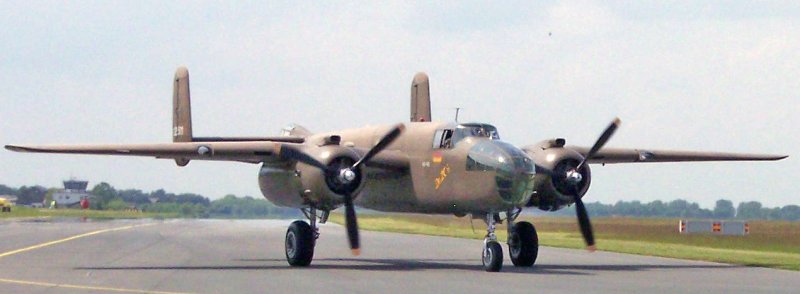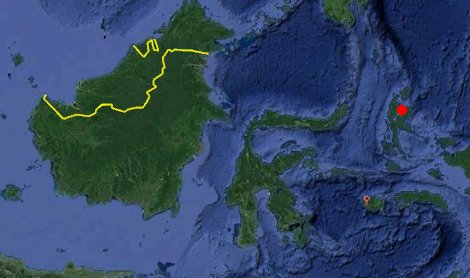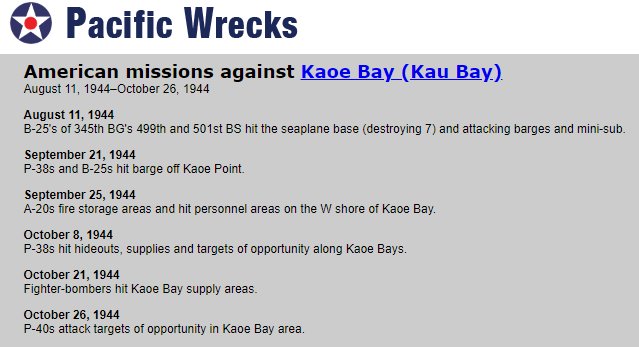ACUFO-1944-08-13-KAOEBAY-1
Ufology sources in the 2000's listed a case dated August 13, 1944, occurring over Kaoe Bay, Indonesia, the source being the 2007 book “Strange Company - Military Encounters with UFOs in World War II” by Keith Chester, himself citing a memorandum from S-2, for the final mission report #226-DX-11, written on August 13, 1944.
The report would say that on the evening, two B-25 crews flying on a night mission to harass Japanese navy ships reported a strange light over southeast Kaoe Bay, Indonesia. A fighter plane of the 418th Night Fighter Squadron (NFS) was attached to the flight of the B-25s.
An S-2 intelligence officer of the 418th NFS is said to have interrogated the eight crew members of the two B-25 and the Night Fighter pilot, and they said they sighted a “very brilliant light appearing to hover for at least five minutes over southeast Kaoe Bay, midway between Cape Tabobo and Cape Jawal”.
The report stated that “it has been established that the light was of magnesium intensity, that its position was some 200 feet below the overcast and some 3.5 miles from the shore. It is therefore suggested that such a light could have been dropped from an enemy aircraft flying in the overcast, and if the flare's composition resembled that of a standard U.S. Army landing flare (which opens in about 200 feet where it is held in position by a 15 feet parachute and gives off intense light for about five minutes). This hypothesis would be consistent in every respect with the phenomenon as reported.”
| Date: | August 13, 1944 |
|---|---|
| Time: | Evening or night. |
| Duration: | 5 minutes. |
| First known report date: | August 13, 1944 |
| Reporting delay: | Hours. |
| Country: | Indonesia |
|---|---|
| State/Department: | |
| City or place: | Kaoe Bay |
| Number of alleged witnesses: | ? |
|---|---|
| Number of known witnesses: | ? |
| Number of named witnesses: | 0 |
| Reporting channel: | Military intelligence mission report. |
|---|---|
| Visibility conditions: | Night or evening. |
| UFO observed: | Yes. |
| UFO arrival observed: | ? |
| UFO departure observed: | ? |
| UFO action: | Hovers. |
| Witnesses action: | |
| Photographs: | No. |
| Sketch(s) by witness(es): | No. |
| Sketch(es) approved by witness(es): | No. |
| Witness(es) feelings: | ? |
| Witnesses interpretation: | ? |
| Sensors: |
[X] Visual: Several.
[ ] Airborne radar: [ ] Directional ground radar: [ ] Height finder ground radar: [ ] Photo: [ ] Film/video: [ ] EM Effects: [ ] Failures: [ ] Damages: |
|---|---|
| Hynek: | NL |
| Armed / unarmed: | Armed, 7.62 mm machine guns. |
| Reliability 1-3: | 2 |
| Strangeness 1-3: | 1 |
| ACUFO: | Negative case, probable flare. |
[Ref. dwn2:] DOMINIQUE WEINSTEIN:
On the evening, two B-25 crews were flying on a night mission to harass japanese navy ships reported a strange light over southeast Kaoe Bay, Indonesia. A fighter of the 418th Night Fighter Squadron (NFS) was attached to the flight of B-25s. An S-2 officer (intelligence) of the 418th NFS interrogated the eight crew members of the two B-25 and the Night Fighter pilot. They sighted a “very brilliant light appearing to hover for at least five minutes over southeast Kaoe Bay, midway between Cape Tabobo and Cape Jawal”. The report stated that “it has been established that the light was of magnesium intensity, that its position was some 200 feet below the overcast and some 3.5 miles from the shore. It is therefore suggested that such a light could have been dropped from an enemy aircraft flying in the overcast, and if the flare's composition resembled that of a standard U.S. Army landing flare (which opens in about 200 feet where it is held in position by a 15 feet parachute and gives off intense light for about five minutes). This hypothesis would be consistent in every respect with the phenomenon as reported.
Sources: Memorandum from S-2, for final Mission report #226-DX- I 1, 13 august 1944, 4181” NFS, Attention A2 / Strange Companies Keith Chester, 2007
[Ref. nip1:] "THE NICAP WEBSITE":
[1944] Aug. 13, 1944; Kaoe Bay, Indonesia
Very brilliant light appearing to hover in air for at least five minutes. (Page 76 Ref.1)
The reference 1 is described at the end of the document as “Strange Company (2007), Keith Chester”.
[Ref. tai1:] "THINK ABOUT IT" WEBSITE:
Date: Aug. 13, 1944
Location: Kaoe Bay, Indonesia
Time:
Summary: Very brilliant light appearing to hover in air for at least five minutes
Source:
The North American B-25 “Mitchell” (Below) was a high-performance medium bomber, used during WWII in Europe and the Pacific by the U.S. Army Air Forces.
Its crew was normally 8 men, its range was 2,170 km, its defensive armament was, depending on the versions, from 2 to 18 12.7 mm caliber machine guns.

|
The night fighter plane accompanying the 2 B-25s is not specified in the report.
We know from historical sources that his unit, the 418th Night Fighter Squadron, used P-70s, P-38s, B-25s, and P-61s. The unit is known to have received the P-61s in September 1944, their aircraft at the time of the sighting was thus most likely a B-25.
“Kaoe Bay” (red dot below) in Indonesia is also called “Kau Bay”, or subsequently “Teluk Kau”.

|
I have the historical trace (Below) of a B-25 mission on Kaoe Bay on August 11, 1944, none on the 13th. It is probable that the 13th was the day the S-2 report was written and that the mission took place on the 11th.

|
It goes without saying that this report is not strange at all, the S-2 - the intelligence service attached to the units of the U.S. Army Air Forces - having itself given a very plausible ordinary explanation.
This is what we call in ufology a “negative case”, that is to say a case for which a prosaic explanation was found straight away, either by the witnesses themselves, or by non-ufologist third parties.
Negative case, probable flare.
* = Source is available to me.
? = Source I am told about but could not get so far. Help needed.
| Main author: | Patrick Gross |
|---|---|
| Contributors: | None |
| Reviewers: | None |
| Editor: | Patrick Gross |
| Version: | Create/changed by: | Date: | Description: |
|---|---|---|---|
| 0.1 | Patrick Gross | October 26, 2023 | Creation, [dwn2], [nip1], [tai1]. |
| 1.0 | Patrick Gross | October 26, 2023 | First published. |